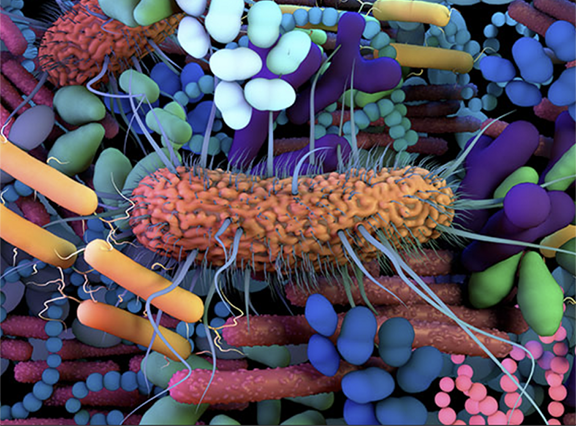
Part Two: Our Gut and Our Immune System
Share
A Four-Part Blog Series
By Carrie Colarusso, Holistic Nutrition Therapist
Part Two: The Gut and Our Immune System
How our gut protects us from infection and disease
Part two of this blog series discusses the microbiota of the gut and its role in our immune system.
The human microbiome overall has more bacterial cells in the body than human cells and up to 1,000 species of bacteria in the human gut microbiome.
- 40 trillion bacterial cells in the body,
- 30 trillion human cells in the body.
Recap from part one of this series:
- The human gut is colonized by a tremendous number of microorganisms, collectively termed the microbiota.
- The gut microbiome actively impacts multiple functions in the body.
- The gut and brain have a direct connection referred to as the gut-brain axis.
The immune system is an integrated network of cells, tissues, organs, and substances that helps the body fight infections and other diseases.
Your gut is your largest immune system organ, containing up to 80% of your body’s immune cells. These cells help to rid the pathogens that pass through daily.

Protection From Infection and Disease
The intestinal mucosal barrier is the innermost layer of the gut wall and made up of immune cells and other protective components.

- Protects the body from harmful substances that land in the intestines
- Defends against toxins and pathogens entering the body
- Regulates nutrient absorption which supports immune health
- Regulates immune response
The blood-brain barrier (bbb) is the inside layer of the blood vessel walls in the brain, is also also semipermeable, and protects the brain from pathogens and other harmful substances that are circulating in the blood.
The gut microbiome controls how your immune system works.
The gut microbiota balance the immune response against pathogens, ensuring the immune response is effective but not destructive to the rest of the body.
By communicating with immune cells, the gut microbiome can control how your body responds to infection. The beneficial microbes in your gut help train your immune system to differentiate them from the unfavorable ones.
These beneficial microbes induce an immune response against gut viruses such as norovirus, but also those infecting other parts of the body such as the flu virus. They do this by triggering special immune cells to produce antiviral proteins that ultimately eliminate viral infections.
Dysbiosis of the gut microbiome compromises immune function.
Beneficial gut microbes compete directly with harmful types for space and nutrients, and preventing them from overrunning the microbiome. When this fails, an imbalance of microbes or dysbiosis occurs.
In chronic diseases, the gut microbiome lacks the bacteria needed to activate immune cells that block the response against harmless bacteria in our guts.
Some of the chronic bacterial infections that can affect your GI tract, including H. pylori, are directly related to having dysbiosis.
The permeability of both the intestinal mucosal barrier and the bbb can be influenced by dysbiosis, as well as stress and inflammation, leading to fluctuations in gut-brain communication.
Immune system activity in our gut has indirect, but significant effects in the brain.

An unbalanced immune response in the gut can increase the permeability of the intestinal lining and allow pathogens and other substances to escape into the bloodstream. This is known as “leaky gut.”
These pathogens and such could potentially
cross the blood brain barrier causing inflammation and may contribute to mood related conditions.
Inflammation is a function of your immune system, but it can become hyperactive and cause chronic inflammation, which is a feature of autoimmune disease and may have a role in many other diseases, including cancer.
Absorption, Production, and Utilization of Nutrients
The gut bacteria is responsible for absorption and production of nutrients that are essential to immune function. They play a significant role in breaking down the nutrients and ensuring their proper utilization, making the good bacteria vital.
A variety of nutrients from are diet are broken down, absorbed, and utilized from gut bacteria including macronutrients such as fat, protein, and carbohydrates, and micronutrients including vitamins and minerals.
The beneficial bacteria provide the enzymes necessary to make vitamins such as the B vitamins B12, thiamin, folate, biotin, riboflavin and pantothenic acid as well as vitamin K.
It is estimated that the gut microbiome contributes about half of the body’s daily vitamin K requirement.
Once the indigestible proteins and carbohydrates get to the large intestine of the gut, they get fermented by the bacteria. The byproducts produced during this process, short-chain fatty acids (SCFAs), are an important nutrient for our immune system.
- They help maintain your gut barrier, keeping the bacteria and toxins contained.
- They also have anti-inflammatory properties for your gut.
- Utilized as fuel for body processes.
A balanced diet leads to a balanced gut microbiome and is key to a healthy immune system and healthy brain.
Read on to Part Three: The Gut and Detoxification
PART TWO REFERENCES
- If you want to boost immunity, look to the gut. Uclahealth.org. Published March 19, 2021. Accessed August 10, 2024. https://www.uclahealth.org/news/article/want-to-boost-immunity-look-to-the-gut#:~:text=But%20you%20might%20not%20realize
- Cleveland Clinic. The blood-brain barrier: Out with the bad, in with the good. Cleveland Clinic. Published 2023. https://my.clevelandclinic.org/health/body/24931-blood-brain-barrier-bbb
- Cleveland Clinic. What Is Your Gut Microbiome? Cleveland Clinic. Published August 18, 2023. https://my.clevelandclinic.org/health/body/25201-gut-microbiome
- A healthy microbiome builds a strong immune system that could help defeat COVID-19. UMass Chan Medical School. Published January 25, 2021. https://www.umassmed.edu/news/news-archives/2021/01/a-healthy-microbiome-builds-a-strong-immune-system-that-could-help-defeat-covid-19/#:~:text=In%20the%20gut%2C%20the%20bacteria
- Shetty M. More Than a Gut Feeling: How Your Microbiome Affects Your Mood | Cognitive Enhancement. Lifestyle Medicine. Published April 8, 2024. Accessed August 10, 2024. https://longevity.stanford.edu/lifestyle/2024/04/08/more-than-a-gut-feeling-how-your-microbiome-affects-your-mood/#:~:text=Neurotransmitters%20are%20crucial%20for%20communication
- Robertson R. Why the Gut Microbiome Is Crucial for Your Health. Healthline. Published June 27, 2017. https://www.healthline.com/nutrition/gut-microbiome-and-health#TOC_TITLE_HDR_6
- Gut Health and Nutrient Absorption. Ixcela. https://ixcela.com/resources/gut-health-and-nutrient-absorption.html#:~:text=The%20bacteria%20in%20the%20gut
- TeamAcko. The Link Between Gut Health and Nutrient Absorption in the Body. Acko General Insurance. Published March 27, 2024. Accessed August 10, 2024. https://www.acko.com/health-insurance/link-between-gut-health-and-nutrient-absorption-in-the-body/
- 8 Vitamins & Minerals You Need for a Healthy Immune System. Cleveland Clinic. https://health.clevelandclinic.org/eat-these-foods-to-boost-your-immune-system
- Did you know that your gut plays a MASSIVE role in detoxification? Read this article to find out how - BiO-LiFE. BiO-LiFE - We care for Your Wellness. Published November 7, 2022. Accessed August 10, 2024. https://biolife.com.my/did-you-know-that-your-gut-plays-a-massive-role-in-detoxification-read-this-article-to-find-out-how/
- Barron K. The Impact of Stress on Gut Health & Detox - WholisticMatters. WholisticMatters. Published November 19, 2022. Accessed August 10, 2024. https://wholisticmatters.com/stress-gut-detox/
- National Cancer Institute. NCI Dictionary of Cancer Terms. National Cancer Institute. Published February 2, 2011. https://www.cancer.gov/publications/dictionaries/cancer-terms/def/immune-system
- Diet, Gut Microbes, and Immunity. hms.harvard.edu. https://hms.harvard.edu/news/diet-gut-microbes-immunity

